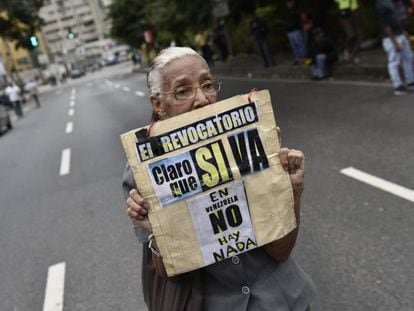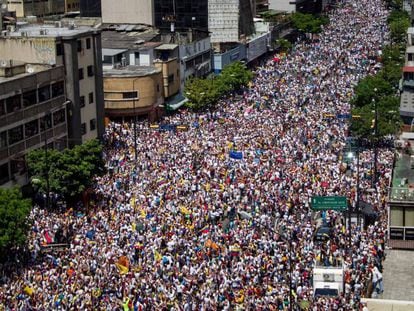Delayed recall referendum in Venezuela pushes elections to 2019
Maduro could go in February plebiscite, but ‘chavismo’ would remain in office through vice-president

Venezuela’s National Electoral Council (CNE), which answers to the government of President Nicolás Maduro, announced on Thursday that there will be no recall referendum until February 2017, thus preventing any possibility of the country’s opposition taking power until the next elections are due, in 2019.
The recall referendum provides a mechanism to remove President Maduro, who took over from Hugo Chávez after his death in March 2013, and is the equivalent of a popular no-confidence vote. Opinion polls suggest the vote would support Maduro’s removal from office.
The opposition, which has organized the recall referendum, wanted the vote to take place before January 10, 2017. Under Venezuela’s Constitution, this would have meant fresh elections if Maduro were to lose the plebiscite.
Shortages of food and medical supplies prompted nationwide riots earlier this year
Now that the vote will take place after that date, a successful recall simply means that the vice-president, Aristóbulo Isturiz, would take Maduro’s place and serve out the remaining two years of his mandate.
Venezuela’s opposition has reacted angrily to the news. The Democratic Unity Roundtable (MUD) has announced it will meet in permanent session to convene a response. “The government is not sending out a message of strength. On the contrary, it is on the point of falling apart, and has no support, either in the polls or on the street,” said Jesús Torrealba, MUD’s secretary general.
The CNE has also imposed strict limits on how the opposition can gather the 20% of votes (around four million) from the electoral register of each of Venezuela’s states, which is the second stage of activating the recall referendum.
It has ruled that this process must take place between October 26 and October 28, between the hours of 8am and 12pm and again between 1pm and 4pm, with just 5,392 identity verification machines distributed at 1,356 polling stations.
“Sadly, we will once again see people having to spend hours lining up, as we did when we collected the 1% of signatures to activate the first stage of the recall referendum,” said Luis Emilio Rondón, the only member of the opposition who sits on the CNE.
The recall referendum is the equivalent of a popular no-confidence vote in Maduro
In June, after the opposition collected nearly two million signatures, the electoral council said all those who signed for a recall vote against the 53-year-old president had to return to the polling stations to verify their signatures through fingerprint detection.
The electoral council had rejected more than a quarter of the nearly two million signatures collected by the opposition. The first stage of the recall referendum process required 200,000 signatures.
The opposition is accusing the government of sabotaging the process through delays, obstacles and veiled threats. International mediators, including the Pope, are attempting to facilitate talks between the opposition and the government.
Meanwhile, Maduro’s popularity continues to wane on the back of the country’s economic crisis and the arrests of political opponents. Shortages of food and medical supplies are also taking their toll, prompting riots earlier this year throughout the country.
The majority of Venezuelans voted for the opposition in the December 6, 2015 parliamentary elections, thus giving it full control of the National Assembly. On September 2, MUD organized a huge march in the the capital that attracted thousands of people, despite government efforts to block access to the city center.
Another protest march in Caracas is planned for Friday.
English version by Nick Lyne.












































